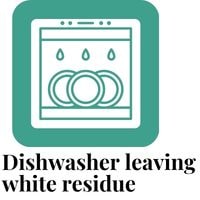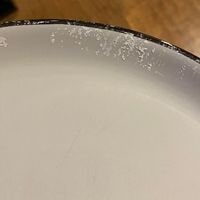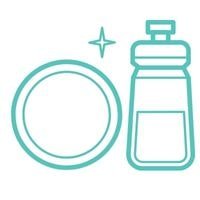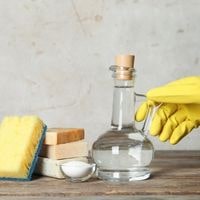Are you facing the problem of the dishwasher leaving white residue after every wash cycle? No doubt it does make you wash for the second time.
It’s annoying, right?
You’ve undoubtedly observed a white residue left behind on the crockery when running them through the dishwasher whether you’ve owned it for long enough.
Deposits found in hard water produce the residue, whereas these mineral deposits seem ugly, they really aren’t hazardous. However, nobody really likes to eat from dishes that are covered in a white coating.
So before jumping to the solution, let’s get into the reason that cause the white residue on the dishes
Dishwasher leaving white residue 
There may be many reasons that the white residue on the dishes and make the dishes look ugly.
Here we are mentioning some reasons that could be the cause of the problem in your case
Detergent
Phosphates have already been eliminated from dishwashing detergents for a long time.
The phosphates did really start cleaning as well as removing all white residue out from plates that had been cleaned inside the dishwasher.
Explore multiple dishwashing detergents to decrease the white residue generated by contemporary detergents, as some are safer than others.
The majority of studies on dishwashing detergents have indicated that pills outperform powders; nevertheless, pills are generally somehow more pricey.
It has also been proven that using a washing agent improves dishwashing performance by reducing stains and imperfections.
Also, make sure that you’re not adding extra dishwasher detergent, as it could be helpful in not leaving white residue behind.
Hard Water
Hard water is defined as water with a high concentration of dissolved minerals, primarily calcium and magnesium.
Hard water is present in most residential water sources, which is why most dishwashers will indeed be impacted.
The water supply will really be influenced to varying degrees depending on where you reside as the aquifer that runs on or via limestone, chalk, or gypsum causes hard water.
No doubt hard water is not dangerous; in fact, it is said to be beneficial to your health.
If you already have spots produced by hard water, you can clean them using lime juice or vinegar.
A water softening system can be implemented in your house if water quality is causing problems with your water system.
Vinegar
White vinegar is by far the most frequent remedy for avoiding white residue on dishes. Put the two tablespoons of white vinegar inside a dishwasher-safe basin or jar and run it through the cycle.
If you’ve got a huge dishwasher, then you may want to use some more vinegar to assure that the vinegar is sufficient. Before putting the vinegar on the tray, keep in mind that the dishwasher is free.
Lock the dishwasher door after that and start a “standard” or “usual” cycle.
Do not use a cycle that raises the temperature. If the dishwasher includes steam vents, be cautious that vinegar might produce a very awful mist that you might not want to consume.
Its impact will also be lessened if the temp is not raised.
When the cycle progresses, the vinegar will eventually overrun into a dishwashing basin due to water from the topmost sprayer hose. The dishwasher would be decalcified by spraying the vinegar solution all over it.
Unlock the dishwasher door after the cycle is done to just let the vinegar leftover air off. Allow the dishwasher to dry out completely overnight if feasible.
If the problem persists, the dishwasher can also be rinsed with vinegar again; but, you must prevent using it on a regular basis.
Vinegar is acid that, if used far too often, can cause harm to your dishwasher, so never use it more than once per month to cleanse it. No doubt, It’s really a good idea to combine vinegar and dishwasher detergent.
Temperature of water
For dishwashing detergents to operate efficiently, water has to be heated enough just to avoid residual build-up.
The detergent would not mix effectively if the water isn’t really hot sufficiently, so residue would not be removed first from crockery even during the wash cycle.
Make absolutely sure that the dishwasher is getting warm enough water to avoid white residue build-up.
The temperature of the water in the dishwasher must be around 120 and 150 Fahrenheit. Many dishwashers have a thermostat that regulates the overall temperature of the water.
Therefore, you may achieve a slight increase in water temperature by simply adjusting the water heater’s level, but just be cautious because this will raise the temperature of the water all throughout the home.
Hard water Dishwashing Detergent
You may buy a calcium carbonate Hard water Dishwashing Detergent and use it in the same manner you would like the vinegar solution. Dishwasher companies commonly suggest using an oxygenated or citric acid cleanser.
Conclusion
We hope after finding the reason for the residual left behind on the dishes, you can easily deal with the white residue on the crockery by just following the above steps precisely.
Dishwasher leaving white residue
Related Guides





